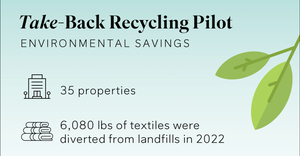Pennsylvania haulers challenge flow-control ordinance.
April 1, 2008
Chris Carlson
A Flow-Control Ordinance in Delaware County, Pa., has been stayed for 120 days following a complaint filed in a federal district court by the Pennsylvania Waste Industries Association (PWIA) and its national affiliate, the Washington-based National Solid Wastes Management Association (NSWMA). The complaint was filed against Delaware County and the Delaware County Solid Waste Authority in the U.S. District Court for Eastern Pennsylvania. The ordinance requires all municipal waste generated in Delaware County be disposed of only at county designated facilities. The suit is likely headed to trial or to a motion of summary judgment in July.
According to NSWMA and PWIA, the ordinance violates the Commerce Clause of the U.S. Constitution and state provisions for revising and approving county waste plans. The complaint was filed on behalf of all haulers who collect solid waste in Delaware County that would be adversely affected by its flow control law. Joseph Vasturia, chairman and CEO of the Delaware County Solid Waste Authority, says that the ordinance was passed because the authority believes it passes constitutional muster.
Records from the Pennsylvania Department of Environmental Protection (DEP) confirm that Houston-based Waste Management owns and operates the only privately owned transfer station in Delaware County. In total, there are three transfer stations located in Delaware County — two are county-owned but operated by Waste Management, and the third is owned and operated by the company. Fairfield, N.J.-based Covanta Holding Corp. owns and operates an incineration and waste-to-energy facility in the county. Also, there are no active landfills within Delaware County; however, the county owns and operates the Rolling Hills Landfill in neighboring Berks County.
David Biderman, general counsel for NSWMA, argues that unlike previous federal court rulings, this ordinance violates the Commerce Clause because facilities involved are privately operated. In April 2007, the U.S. Supreme Court ruled in United Haulers Association v. Oneida-Herkimer Solid Waste Management Authority that flow control to public facilities was permissible and benefited the community. In 1994, the high court struck down a flow control law that directed waste to a facility that was owned by a private firm. Biderman explains that some of the county's waste, in the absence of flow control, goes to transfer stations in neighboring counties instead of county-owned stations or the Covanta facility. “Because of flow control, all commercial waste collected by private haulers in Delaware County would be forced to the county-owned, privately operated transfer stations, which have a contract with Covanta,” he says.
Based on what he's seen so far, Barry Shanoff, general counsel for the Solid Waste Association of North America, says the nature of the operations for the facilities in this case is not so fundamentally different from the ones in the Oneida-Herkimer case — making it difficult to prove the ordinance is unconstitutional. “[The constitutional argument] is so weak and tenuous that it seems they'll have to rely on the state law claim to get it through,” he says.
The Pennsylvania Municipal Waste Planning, Recycling and Waste Reduction Act of 1988 requires every county to operate under a plan that has been approved by the DEP. Before a plan can be revised, counties must follow a mandatory planning process that includes notifying the DEP, allowing for industry and public input, receiving final DEP approval of the revisions, and implementing ordinances. Deborah Fries, community relations supervisor for the DEP Southeast Regional Office, which coves the five urban counties surrounding Philadelphia, including Delaware County, says the DEP never received a copy of the ordinance. Vasturia says he did not think it was necessary to send them a copy of the ordinance before it was passed.
“Compliance with this new ordinance would require substantial operational changes by our members that would be difficult to manage on such short notice, and, in the long run, the lack of competition would mean higher disposal costs for everyone, including the consumer,” said Tim O'Donnell, president of the PWIA, in a press release.
You May Also Like


